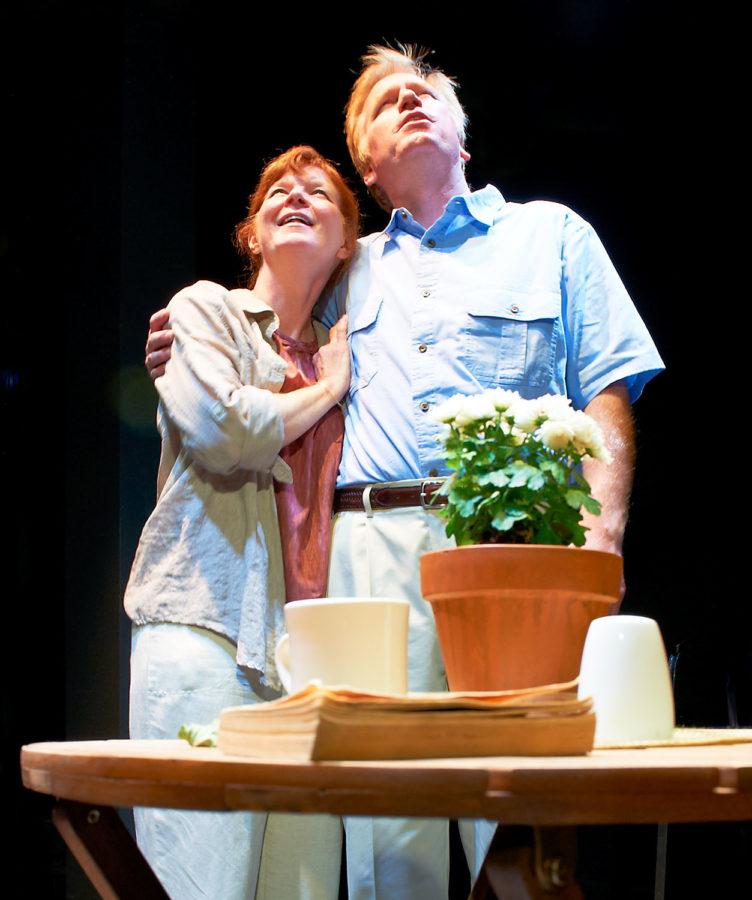Under the Blue Sky is a tremendous play tucked into a tiny theater. Nestled just under the Berwyn stop of the Red Line, Steep Theatre is an intimate and surprisingly meditative space. Emerging organically out of its audience, the stage at Steep is designed to maximize both reality and intensity—a setup that benefits its current production of David Eldridge’s Under the Blue Sky. Eldridge’s script is, essentially, a character study of six English teachers; it focuses on the lives these academics lead outside of their classrooms and is set in a world that is being blown apart by both bombs and love alike. The play is divided into three acts, all helmed by six Steep company members who maneuver about the stage with an ease that defies its size constraints.
Act One commences with Nick (Michael Salinas), a twenty-something who is left unfulfilled by his current teaching position, and his old friend and colleague, Helen (Caroline Neff). With a startling impassivity, the pair begins discussing a bombing that has just taken place a few streets down. Helen frets over its closeness, while Nick chastises her for initially believing it to be lightning—lightning, he says, wouldn’t rock the whole flat. The conversation shifts as Nick tells Helen he has something serious to discuss with her. Helen, assuming Nick is ready to move their friendship to the next level, jumps with premature excitement. She is immediately crushed, though, as Nick tells her he’s found a new job in a town far away and that he is seriously considering taking it. Helen is surprised and hurt, and only after banter and wielded knives is the truth of her unrequited love laid bare. So begins the play’s raw and often ugly examination of love and the psyche in times of war.
In contrast to the literal warfront of Act One, Act Two specifically details the effects of war on the psyche. It begins with Michelle (Julia Siple) and Graham (Alex Gillmor) drunkenly stumbling into a dark bedroom. After a little undressing and a lot of role-playing, Graham gets overeager and the pair is forced to stop. With unadulterated honesty, the duo dissolves into a verbal sparring match, detailing a subtle perversity that has defined their relationship as coworkers for years. Most shocking to the audience and Michelle alike is the revelation that Graham has been stalking Michelle for years, and that he has a collection of photos of her in compromising positions with a student. The photos, Graham tells Michelle, will go public unless she agrees to try and sleep with him again. The scene that follows, with Michelle forced to role-play as a nurse to Graham’s injured army man, is equal parts absurd and tragic. It is a testament to the play’s strength that what started off as the most comedic act should conclude as the play’s most emotionally demanding.
In contrast to Graham’s dark bedroom, the set of Act Three is a sunny garden. In it are Anne (Melissa Riemer) and Robert (Jim Poole), old teaching companions and holiday travel partners. Anne and Robert’s present is entirely different from the world we left behind in Act Two, but Eldridge begins to tie everything together as Robert and Anne discuss the recent death of a local teacher. It becomes apparent that the schoolroom drama Robert and Anne discuss is centered entirely around the lives of the teachers whom the audience has just peeked in on, and the aloofness characteristic of gossip with which Robert and Anne speak serves to make their news all the more weighty. Robert begins to discuss with Anne his plans for their upcoming holiday, but she interrupts to say that she won’t be travelling with him. She’s already made plans with her aunt to go to a war cemetery to visit the grave of her aunt’s long lost love, and she proceeds to tell Robert the story of how her aunt lost her beloved. It’s with this that Eldridge completes his war-centered tripartite and Under the Blue Sky delves into the ramifications of war in history. It is an effective note to end on, and as Anne and Robert move back into the present and battle over a love that is all their own, it is clear that Eldridge’s script, despite having premiered in London in 2000, has never been more relevant than it is today.
At once both alienating and moving, David Eldridge’s Under the Blue Sky is a fascinating exploration of the human experience under duress, both from within and without. The context of Steep’s cloistering reality intensifies the experience, so make sure to arrive early and grab a good seat. However, whether you’re in the back row or in the row set just a few feet from Graham’s bed, don’t worry—Eldridge’s script will hit hard, regardless.









